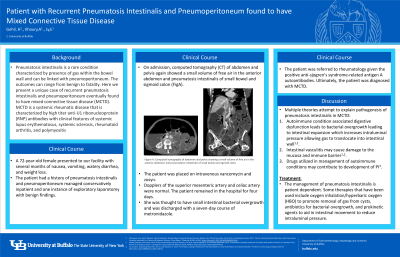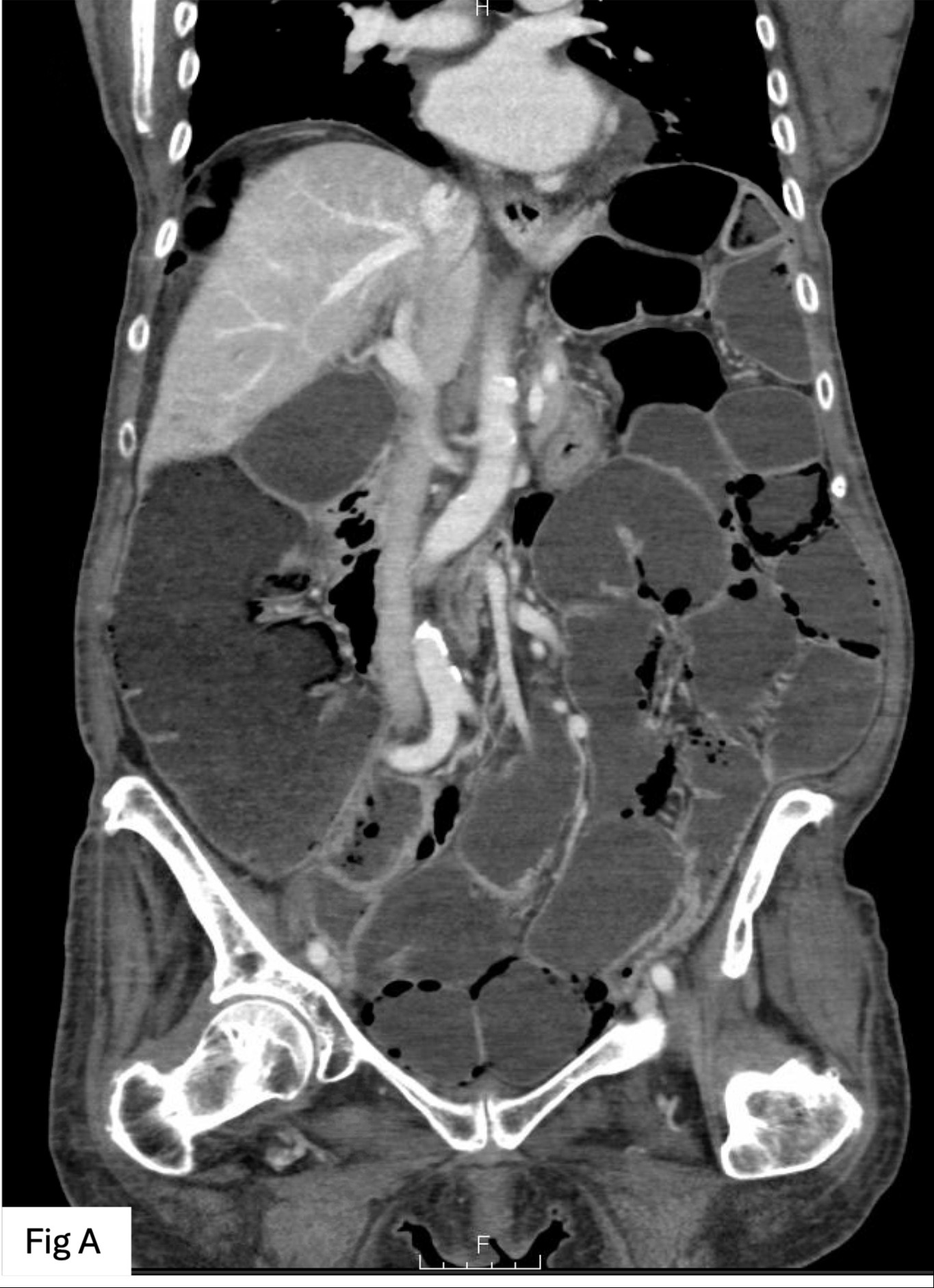Tuesday Poster Session
Category: Small Intestine
P4957 - Patient With Recurrent Pneumatosis Intestinalis and Pneumoperitoneum Found to Have Mixed Connective Tissue Disease
Tuesday, October 29, 2024
10:30 AM - 4:00 PM ET
Location: Exhibit Hall E

Has Audio

Himaben Gohil, DO
University of Buffalo
Buffalo, NY
Presenting Author(s)
Himaben Gohil, DO1, Anthony Khoury, DO2, Erin K. Ly, MD2
1University of Buffalo, Buffalo, NY; 2University at Buffalo, Buffalo, NY
Introduction: Pneumatosis intestinalis (PI) is a rare condition characterized by presence of gas within the bowel wall and can be linked with pneumoperitoneum (PM). The outcomes can range from benign to fatality. Here we present a unique case of recurrent PI and PM eventually found to have mixed connective tissue disease (MCTD). MCTD is a systemic rheumatic disease that is characterized by high titer anti-U1 ribonucleoprotein (RNP) antibodies with clinical features of systemic lupus erythematosus, systemic sclerosis, rheumatoid arthritis, and polymyositis.
Case Description/Methods: A 72-year-old female presented to our facility with several months of nausea, vomiting, watery diarrhea, and weight loss. The patient had a history of PI and PM managed conservatively inpatient and one instance of exploratory laparotomy with benign findings. On admission, computed tomography (CT) of abdomen and pelvis again showed a small volume of free air in the anterior abdomen and PI of small bowel and sigmoid colon (FigA). The patient was placed on intravenous vancomycin and zosyn. Dopplers of the superior mesenteric artery and celiac artery were normal. The patient remained in the hospital for four days. She was thought to have small intestinal bacterial overgrowth and was discharged with a seven-day course of metronidazole. The patient was referred to rheumatology given the positive anti-sjogren’s syndrome-related antigen A autoantibodies. Ultimately, the patient was diagnosed with MCTD.
Discussion: Multiple theories attempt to explain pathogenesis of PI in MCTD. One theory states that autoimmune condition associated digestive dysfunction leads to bacterial overgrowth leading to intestinal expansion which increases intraluminal pressure allowing gas to translocate into intestinal wall. Another theory states that intestinal vasculitis may cause damage to the mucosa and immune barrier. Lastly, drugs utilized in management of autoimmune conditions may contribute to development of PI. The management of PI is patient dependent. Some therapies that have been used include oxygen inhalation/hyperbaric oxygen (HBO) to promote removal of gas from cysts, antibiotics for bacterial overgrowth, and prokinetic agents to aid in intestinal movement to reduce intraluminal pressure. In the case of our patient, antibiotics and bowel rest were the best course of treatment.

Disclosures:
Himaben Gohil, DO1, Anthony Khoury, DO2, Erin K. Ly, MD2. P4957 - Patient With Recurrent Pneumatosis Intestinalis and Pneumoperitoneum Found to Have Mixed Connective Tissue Disease, ACG 2024 Annual Scientific Meeting Abstracts. Philadelphia, PA: American College of Gastroenterology.
1University of Buffalo, Buffalo, NY; 2University at Buffalo, Buffalo, NY
Introduction: Pneumatosis intestinalis (PI) is a rare condition characterized by presence of gas within the bowel wall and can be linked with pneumoperitoneum (PM). The outcomes can range from benign to fatality. Here we present a unique case of recurrent PI and PM eventually found to have mixed connective tissue disease (MCTD). MCTD is a systemic rheumatic disease that is characterized by high titer anti-U1 ribonucleoprotein (RNP) antibodies with clinical features of systemic lupus erythematosus, systemic sclerosis, rheumatoid arthritis, and polymyositis.
Case Description/Methods: A 72-year-old female presented to our facility with several months of nausea, vomiting, watery diarrhea, and weight loss. The patient had a history of PI and PM managed conservatively inpatient and one instance of exploratory laparotomy with benign findings. On admission, computed tomography (CT) of abdomen and pelvis again showed a small volume of free air in the anterior abdomen and PI of small bowel and sigmoid colon (FigA). The patient was placed on intravenous vancomycin and zosyn. Dopplers of the superior mesenteric artery and celiac artery were normal. The patient remained in the hospital for four days. She was thought to have small intestinal bacterial overgrowth and was discharged with a seven-day course of metronidazole. The patient was referred to rheumatology given the positive anti-sjogren’s syndrome-related antigen A autoantibodies. Ultimately, the patient was diagnosed with MCTD.
Discussion: Multiple theories attempt to explain pathogenesis of PI in MCTD. One theory states that autoimmune condition associated digestive dysfunction leads to bacterial overgrowth leading to intestinal expansion which increases intraluminal pressure allowing gas to translocate into intestinal wall. Another theory states that intestinal vasculitis may cause damage to the mucosa and immune barrier. Lastly, drugs utilized in management of autoimmune conditions may contribute to development of PI. The management of PI is patient dependent. Some therapies that have been used include oxygen inhalation/hyperbaric oxygen (HBO) to promote removal of gas from cysts, antibiotics for bacterial overgrowth, and prokinetic agents to aid in intestinal movement to reduce intraluminal pressure. In the case of our patient, antibiotics and bowel rest were the best course of treatment.

Figure: Figure A: Computed tomography of abdomen and pelvis showing pneumatosis intestinalis of the small bowel.
Disclosures:
Himaben Gohil indicated no relevant financial relationships.
Anthony Khoury indicated no relevant financial relationships.
Erin Ly indicated no relevant financial relationships.
Himaben Gohil, DO1, Anthony Khoury, DO2, Erin K. Ly, MD2. P4957 - Patient With Recurrent Pneumatosis Intestinalis and Pneumoperitoneum Found to Have Mixed Connective Tissue Disease, ACG 2024 Annual Scientific Meeting Abstracts. Philadelphia, PA: American College of Gastroenterology.
